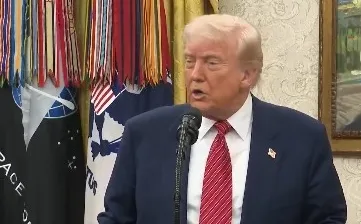Can Trump Facilitate De-escalation Between India and Pakistan?

Synopsis
Key Takeaways
- Trump calls for immediate de-escalation of tensions between India and Pakistan.
- Secretary of State Rubio is in constant contact with both nations.
- The U.S. emphasizes the importance of communication and dialogue.
- There is a focus on addressing support for terrorist groups.
- The situation impacts regional peace and security in South Asia.
Washington, May 9 (NationPress) US President Donald Trump is urging for tensions between India and Pakistan to de-escalate swiftly, as stated by the White House on Friday.
This message has been communicated to both nations by Secretary of State Marco Rubio, who is temporarily fulfilling the role of the president's national security adviser.
“The president has indicated his desire for a rapid de-escalation,” said White House spokesperson Karoline Levitt during a briefing.
“He recognizes that these nations have been in conflict for many years, even prior to his administration. Nonetheless, he maintains positive relationships with the leaders of both countries.”
When asked whether the President intends to speak with the leaders of these nations, Levitt indicated that updates will be provided when that occurs.
Currently, Secretary of State Rubio is leading US efforts in the region. She mentioned that the secretary has been “in continuous contact with the leaders of both nations in an effort to resolve this conflict.”
Secretary Rubio engaged in discussions on Thursday with External Affairs Minister S. Jaishankar and Pakistani Prime Minister Shehbaz Sharif.
While expressing condolences for the casualties from the April 22 Pahalgam terrorist attack carried out by a group based in Pakistan, the secretary “urged India to collaborate with Pakistan to reduce tensions and uphold peace and security in South Asia.”
The message conveyed to Sharif also highlighted the necessity for de-escalation, but emphasized that Pakistan must “cease any support for terrorist organizations,” aligning with India's stance that Pakistan has been a supporter of terrorism.
Tammy Bruce, the state department spokesperson, noted that the US message to both India and Pakistan is twofold: “To avoid escalation and to emphasize the importance of communication, encouraging dialogue rather than silence. America, of course, has been actively engaged with multiple leaders from both nations over the past two days.”










